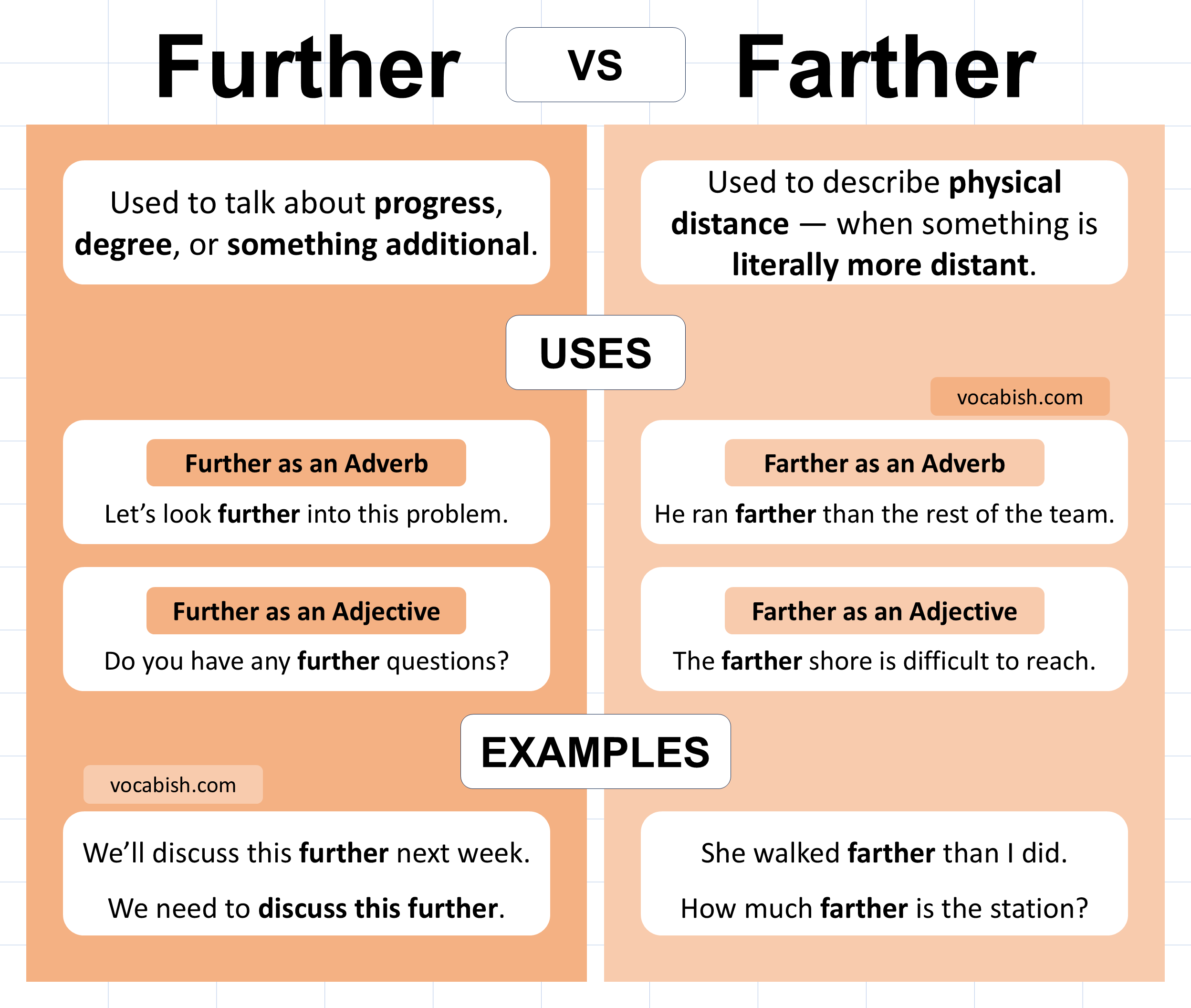Many English learners find further and farther confusing because they both relate to distance or progress.
Don’t worry — the difference is simple! This easy guide will help you understand when to use further and farther with clear meanings and examples.
Meanings of Further and Farther
Further
Used to talk about progress, degree, or something additional. It often refers to figurative distance (not physical).
- We need to discuss this further.
- She wants to study further to improve her skills.
Farther
Used to describe physical distance — when something is literally more distant.
- My house is farther from the city than yours.
- He ran farther than anyone else in the race.
Differences Between Further and Farther
| Feature | Further | Farther |
|---|---|---|
| Type of Distance | Figurative or abstract distance | Physical or measurable distance |
| Meaning | More, additional, or to a greater degree | At or to a greater physical distance |
| Common Use | Used for ideas, time, or progress | Used for space or actual distance |
| Example | Let’s talk about it further tomorrow. | He walked farther down the road. |
- If it’s about real distance, use farther.
- If it’s about extra or more (ideas, time, progress), use further.
Usage of Further
Further is more flexible — it can be used as an adjective, adverb, or verb.
Further as an Adverb
- I can’t continue further without help.
- Let’s look further into this problem.
Further as an Adjective
- We need further information about the case.
- Do you have any further questions?
Further as a Verb
- The company aims to further education in rural areas.
- She worked hard to further her career.
Meaning Summary:
Further = More, in addition, or to continue progress.
Usage of Farther
Farther is mainly used when speaking about physical distance or measurement.
Farther as an adverb
- The school is farther from here than I thought.
- He ran farther than the rest of the team.
Farther as an adjective
- The farther mountain range is covered in snow.
- The farther shore is difficult to reach.
Common Expression:
“How much farther is it?” — used when asking about real distance.
Formal and Informal Uses of Further and Farther
| Type | Word | Example | Usage |
|---|---|---|---|
| Formal | Further | Please contact us for further information. | Used in writing, business, and education. |
| Informal | Further | Let’s talk about it further later. | Common in everyday speech. |
| Formal | Farther | The city is farther from here than it seems. | Used in physical descriptions or reports. |
| Informal | Farther | How much farther is the station? | Common in daily talk about distance. |
Summary
- Further → Used for ideas, time, or progress.
Example: We’ll discuss this further next week. - Farther → Used for physical distance.
Example: She walked farther than I did.
Quick Trick to Remember:
- If you can measure it → use farther.
- If you can’t measure it → use further.
FAQs on Farther vs Further
What is the main difference between further and farther?
Further refers to progress or additional information, while farther refers to physical distance.
Can further and farther be used interchangeably?
Sometimes, yes. In modern English, many people use further for both, but farther is preferred for actual distance.
Is further more formal than farther?
Yes, further is more common in formal writing and polite conversation.
How do I know when to use farther?
Use farther when you’re talking about how far something or someone travels physically.
Which is more common in modern English?
Further is more common today, especially in writing, education, and everyday English.
Read More

